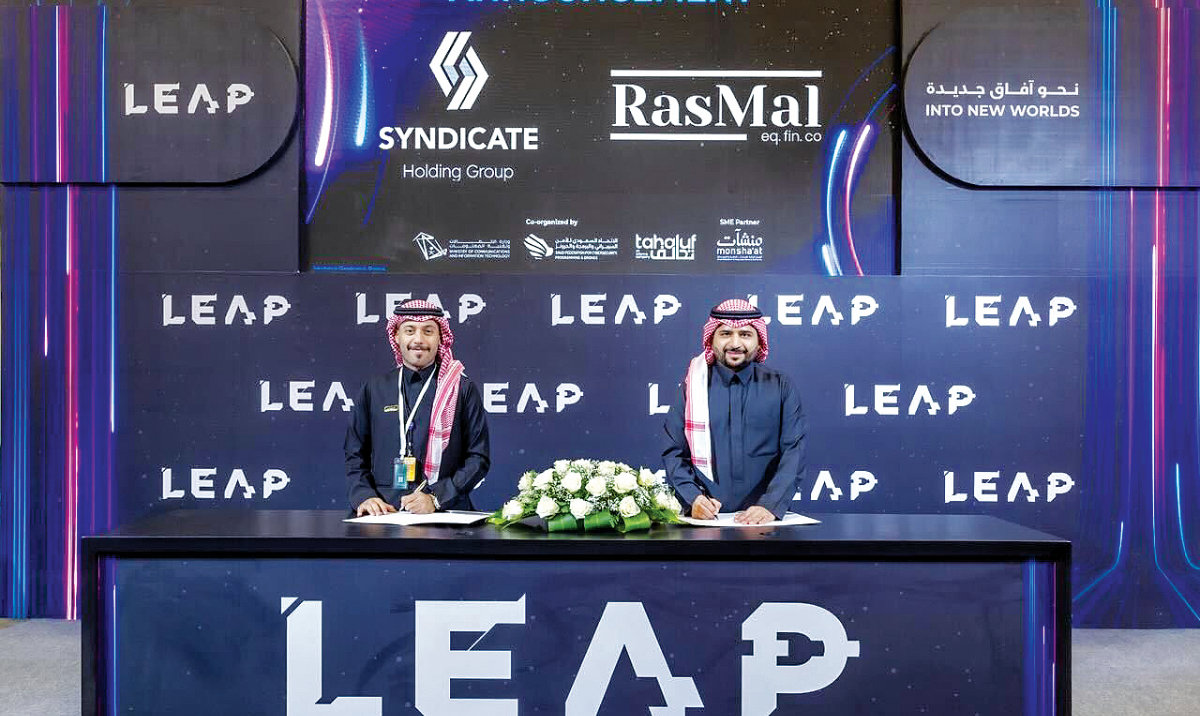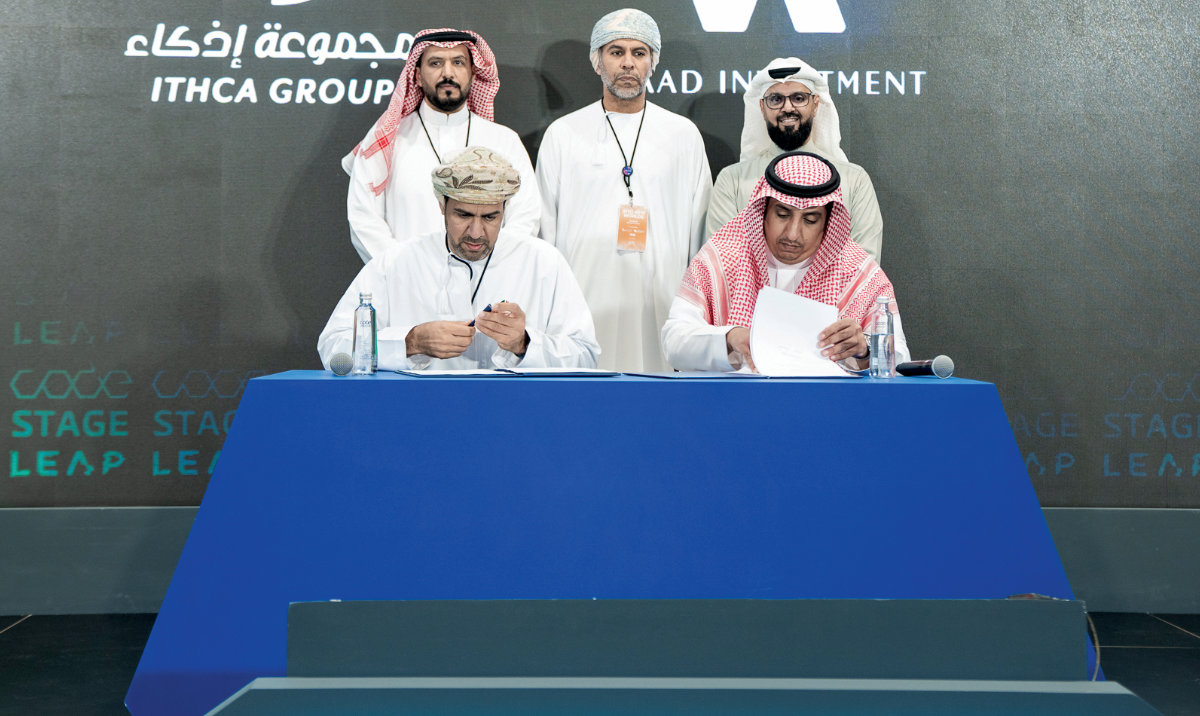RIYADH: Saudi Arabia’s LEAP 2025 tech conference, held from Feb. 9 to 12, showcased the Kingdom’s growing startup ecosystem, with multiple funding rounds, acquisitions, and expansion plans announced during the event.
The conference, a key platform for innovation and investment, further cemented Saudi Arabia’s role as a regional hub for fintech, e-commerce, logistics, and emerging technologies.
Saudi Arabia-based contech startup BRKZ used the forum to announce the completion of a $17 million series A extension, which includes $8 million raised in March 2023 and $1 million in venture debt.
Investors in the round included Capifly, along with existing backers BECO Capital, Aramco’s Waed, and 9900 Capital, as well as Better Tomorrow Ventures, RZM Investment, and Class 5 Global.
MISY Ventures, Knollwood Investment Advisory, and Fluent Ventures are also among the supporters. Founded in 2023 by Ibrahim Manna, BRKZ is a B2B construction technology platform that connects suppliers and buyers while offering various delivery and payment options. The latest funding brings BRKZ’s total capital raised to $22.5 million.
Tabby doubles valuation to $3.3bn with a $160m round
Saudi Arabia-based fintech Tabby has secured $160 million in a series E funding round at a $3.3 billion valuation.
The round was led by existing investors Blue Pool Capital and Hassana Investment Company, with additional participation from STV and Wellington Management.
Founded in 2019 in the UAE by Hosam Arab, Tabby operates as a buy now, pay later platform, handling $10 billion in annualized transaction volumes.

Saudi-based fintech startup RasMal has closed a $4.8 million pre-series A investment round, led by Syndicate Element Holding Group. (Supplied)
The new funds will be used to accelerate the company’s expansion in financial services, including digital spending accounts, payments, cards, and money management tools.
The latest investment also strengthens Tabby’s planned initial public offering. The company had previously raised $200 million in a series D round in October 2023.
Buildnow closes $9.7m to expand SME-focused construction financing
Saudi Arabia-based Buildnow has raised $9.7 million in a funding round led by STV and Arbah Capital, with additional financing coming from a mix of debt and equity.
Founded in 2022 by Hisham Al-Saleh, Rahat Dewan, and Abdulla Sheikh, Buildnow is a build now, pay later platform that supplies construction materials on flexible credit terms while paying small and medium enterprise suppliers upfront in cash.
The new capital will be used to scale its operations in the construction and building sector. In March last year, the company closed a $9.4 million seed round, comprising $6.5 million in equity and $2.9 million in debt financing.
Taager raises $6.75 million to expand social e-commerce in MENA
Social e-commerce platform Taager, which was founded in Egypt and is now headquartered in Saudi Arabia, has secured $6.75 million in a pre-series B round led by Norrsken22.
Launched in 2019 by Abdelrahman Sherief, Ahmed Ismail, Ismail Omar, and Mohammed El-Horishy, Taager helps entrepreneurs start and scale online businesses by offering product sourcing, storage, shipping, and customer payment solutions.
Operating in Saudi Arabia, Egypt, the UAE, and Iraq, the company aims to further expand across the Middle East with its new funding.
In 2021, Taager raised $6.4 million in a seed round led by 4DX Ventures, Raed Ventures, and other investors.
RasMal raises $4.8m to enhance digital cap table management
Saudi-based fintech startup RasMal has closed a $4.8 million pre-series A investment round, led by Syndicate Element Holding Group.
Founded in 2019 by Basil Al-Kuraya and Nasser Al-Tamimi, RasMal offers digital solutions for private companies to automate cap table management, fundraising, and equity transfers.
The company also supports investors and private funds in streamlining investment processes. The new funding will be used to introduce new tools and services to further enhance fundraising and equity management for its clients.
Waad Investment secures backing from Oman’s ITHCA Group
Saudi-based Waad Investment has announced an investment from ITHCA Group, an entity created by Oman Investment Authority in 2019.
The deal aims to strengthen telecom, IT, and venture capital collaboration between Saudi and Omani companies, supporting the Kingdom’s Vision 2030 and the sultanate’s Vision 2040.

Saudi-based Waad Investment has announced an investment from ITHCA Group.
PIESHIP secures $2.1m seed round for logistics expansion
Logistics startup PIESHIP raised $2.1 million in a seed round led by Nama Ventures, with participation from SEEDRA Ventures and angel investors.
Founded in Saudi Arabia in 2023 by Nasser Al-Harthi, Musaed Al-Amri, and Mohammed Mohsen, PIESHIP provides warehouse management solutions, last-mile delivery services, and logistics technology.
The investment will support the company’s growth in the Saudi market. The startup previously secured an undisclosed pre-seed investment from Nama Ventures and SEEDRA Ventures.
LAHINT raises $1m to expand automated government services
LAHINT, a Saudi-based e-services platform, has raised $1 million in a pre-seed funding round from undisclosed investors.
Founded in 2023 by Ahmed Saber and Mohamed Ibrahim, LAHINT provides automated government services for both individuals and businesses.
The company plans to expand its service offerings and introduce AI-powered eligibility consultations. Last year, LAHINT raised $267,000 in an earlier pre-seed round.
Mush Social acquires Pubbles to expand virtual communities
Social media platform Mush Social has acquired Pubbles, a social media app operating in the Kingdom, to enhance its user base and digital presence.
Founded in Saudi Arabia in 2022 by Abdulhadi Al-Asmi, Mush Social enables users to earn points and own virtual assets through its interactive map feature.
Pubbles, launched in 2020, specializes in virtual communities and interactive technologies. In November 2024, Mush Social secured a $1.2 million pre-seed round led by Nifal Consulting.
Salla acquires Sweply, rebrands it as Salla Ads
Saudi e-commerce Software-as-a-Service provider Salla has acquired Sweply, a digital advertising platform, as part of its strategy to integrate advertising solutions into its ecosystem.
Founded in 2016 by Nawaf Hariri and Salman Butt, Salla enables merchants to set up online stores quickly.
Sweply, launched in 2021 by Ebrahim Saeed and Wael Hassan, specializes in automated digital advertising.
Following the acquisition, Sweply will be rebranded as “Salla Ads.” In March, Salla raised $130 million in a pre-IPO round led by Investcorp, Sanabil Investment, and STV.
Foodics acquires UK-based Solo Venture, invests in three startups
Saudi Arabia-based Foodics has acquired UK-based Solo Venture, a provider of self-ordering kiosks and online ordering solutions, as part of its strategy to enhance its restaurant and payments technology ecosystem.
Founded in 2014 by Ahmad Al-Zaini and Mosab Al-Othmani, Foodics offers a point-of-sale and restaurant management platform for dine-in restaurants, food trucks, and cloud kitchens.
Alongside the acquisition, Foodics has invested in Norma, a Greek AI-powered data analytics firm; Add, an accounting system for small businesses; and Arzaq Plus, a supply chain platform using AI and smart logistics to optimize sourcing and reduce waste.
Foodics also plans to introduce a buy now, pay later feature for restaurant bills, improving cash flow management.
Unipal raises pre-series A funding to expand in Saudi Arabia
Bahrain-born education tech startup Unipal has closed its pre-series A funding round, led by Plus VC with participation from Al Jazira Capital, RZM Investments, Falak Angels, and Doha Tech Angels.
Founded in 2020 by Ali Al-Alawi and Ali Al-Shaer, Unipal provides discounts and special offers to university students via its platform.
The funding will support Unipal’s expansion into Jeddah, Madinah, Dammam, and Khobar and the launch of its new AI-driven app.
T2 acquires majority stake in fintech platform Moola
Saudi tech services provider T2 has acquired a majority stake in Moola, a Saudi expense management platform, to enter the fintech sector.
Founded in 2022 by Waseem Hammoud, Moola provides corporate business cards and financial automation tools. T2 serves over 12,000 clients with software and business intelligence solutions.
Raenest secures $11m series A for African expansion
Raenest, a multi-currency accounts platform for African businesses, has closed an $11 million series A led by QED Investors, with backing from Norrsken22, Ventures Platform, P1 Ventures, and Seedstars.
The funding will help Raenest expand in Nigeria, Kenya, the US, and Egypt, while growing Geegpay, its payment solution for Africa’s gig economy.
MENA startup funding reaches $863m in January
The MENA startup ecosystem raised $863 million in January, across 63 funding rounds, though $768 million came from debt financing. When excluding debt, the investment level was similar to January 2024, according to Wamda’s monthly report.
Saudi Arabia dominated regional funding, securing $839.5 million across 21 deals, with Lendo and Forus debt rounds accounting for $750 million.
The UAE followed with $14.6 million across 15 deals, while Egyptian startups raised $6 million from seven transactions. Other MENA countries collectively raised less than $2.5 million.
The fintech sector led with $776.6 million across 11 deals, largely due to Lendo and Forus’ financings. Property tech attracted $38.7 million, while e-commerce startups secured $30 million across five rounds.






























